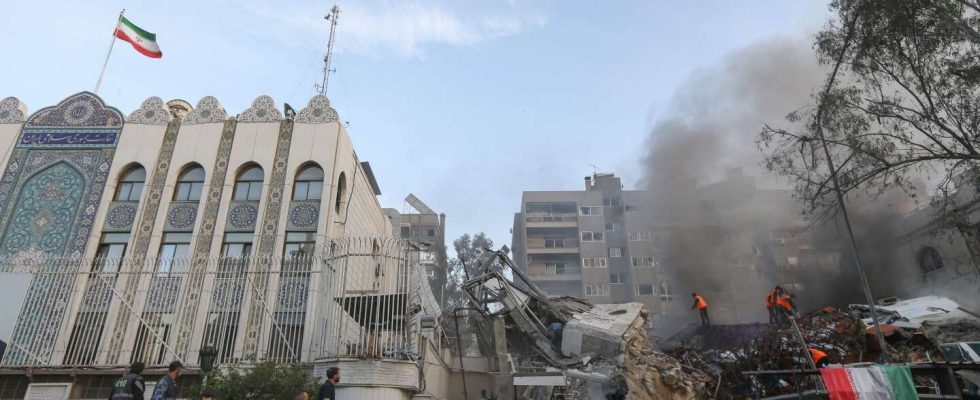In an escalation that sounds like a provocation towards Iran, Israel has dealt a crushing blow to the “axis of resistance”. Monday 1er April, strikes attributed to Israeli aircraft pulverized the Iranian consulate in Damascus, the Syrian capital, killing two commanders of the Al-Quds Force, as well as five other members of this branch of the Revolutionary Guards responsible for external operations.
In the heart of Mazzeh, the embassy district of Damascus, all that remains is a pile of rubble and the door of the building indicating “consular section of the Iranian embassy”. Late Monday afternoon, airstrikes completely destroyed this building located in the Iranian embassy complex. The diplomatic representation, decorated with a huge portrait of Ghassem Soleimani, the former head of the Al-Quds Force, killed in January 2020 in an American drone attack in Iraq, was closed on the occasion of the thirteenth day of Nowrouz, the traditional festival celebrating the new year of the Persian calendar.
Denouncing the attack on the diplomatic representation as “a violation of all international obligations and conventions”Iranian Foreign Minister Hossein Amir-Abdollahian called ” the international community “ to bring “a serious answer” to these “criminal actions” which he attributed to Israel. His spokesperson added that the Islamic Republic will decide what type of reaction and punishment it will adopt against the Jewish state.
“By targeting the Iranian consulate in Damascus, which is considered Iranian territory under international law, Israel is forcing Iran to the wall. The rules of engagement of the past are now completely obsolete. Not reacting is no longer an option for Tehran”believes Hamidreza Azizi, researcher at the Stiftung Wissenschaft und Politik research institute in Berlin.
Iran is indeed facing a dilemma. A response could provoke open conflict with Israel and a regional conflagration. A scenario that Tehran has sought to avoid since the start of the war in the Gaza Strip on October 7, 2023, leaving its allies within the “axis of resistance” – Lebanese Hezbollah, Iraqi militias and Yemeni Houthis. – attack the Jewish state alone in support of Palestinian Hamas. But failure to respond could tarnish Tehran’s reputation within this axis and reduce to nothing its power of deterrence against Israel, thus exposing its cadres to other attacks.
You have 59.81% of this article left to read. The rest is reserved for subscribers.

